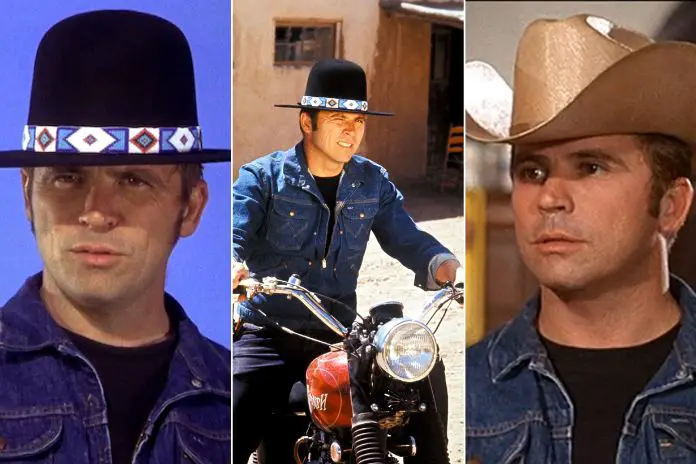Billy Jack is a series of action-drama films released in the 1970s, with the title character portrayed by actor and director Tom Laughlin. The primary theme of the Billy Jack series revolves around the character’s pursuit of justice and his efforts to protect the freedom of a Native American boarding school and its students.
People love the Billy Jack series for its strong, socially conscious themes and the powerful performance of Tom Laughlin as the title character. The films also address important issues of the time, such as racism, violence, and oppression, making them both entertaining and thought-provoking.
The Billy Jack series became popular due to its unique blend of action, drama, and socially relevant themes, as well as its strong central character. The films were also known for their innovative use of music and cinematography, which helped to create a distinctive visual style that set them apart from other action films of the time.
The Billy Jack series consists of four films: “The Born Losers” (1967), “Billy Jack” (1971), “The Trial of Billy Jack” (1974), and “Billy Jack Goes to Washington” (1977). The series remains a cult classic, with a dedicated fan base that continues to appreciate its socially conscious themes and powerful performances.
List all the billy jack movies in order
The Billy Jack movie series consists of four films:
- Born Losers (1967)
- Billy Jack (1971)
- The Trial of Billy Jack (1974)
- Billy Jack Goes to Washington (1977)
- The Return of Billy Jack (1985)
Contents
1. “Born Losers” (1967)
“Born Losers” (1967) is a crime drama film directed by Tom Laughlin. The film is considered as the first installment in the Billy Jack film series and stars Tom Laughlin, Elizabeth James, Jeremy Slate, and Bernadette Ortiz. The film follows the story of Billy Jack, a half-Indian, half-white, Vietnam War veteran who tries to protect the town of French Lick from a motorcycle gang that is terrorizing the town’s residents.
2. “Billy Jack” (1971)
“Billy Jack” (1971) is a martial arts action film directed by Tom Laughlin. The film is the second installment in the Billy Jack film series and stars Tom Laughlin, Delores Taylor, Clark Howat, and Victor Izay. In this film, Billy Jack takes on the task of protecting a progressive school that teaches non-violent communication and is being threatened by a group of violent vigilantes.
3. “The Trial of Billy Jack” (1974)
“The Trial of Billy Jack” (1974) is a martial arts drama film directed by Tom Laughlin. The film is the third and final installment in the Billy Jack film series and stars Tom Laughlin, Delores Taylor, Clark Howat, and Victor Izay. In this film, Billy Jack is put on trial for the murder of a member of a motorcycle gang, and the trial serves as a backdrop for exploring issues such as racism, tribalism, and political corruption.
4. “Billy Jack Goes to Washington” (1977)
“Billy Jack Goes to Washington” (1977) In this film, Billy Jack (played by Tom Laughlin) is elected to the U.S. Senate and quickly finds himself in conflict with the corrupt political establishment. Despite opposition from powerful forces, Billy uses his unique fighting skills and unwavering commitment to justice to fight for the people and their rights. Along the way, he faces numerous challenges, including attempts on his life and a rigged political trial, but he remains steadfast in his quest for a better world.
5. “The Return of Billy Jack” (1985)
“The Return of Billy Jack” (1985) In this final installment of the series, Billy Jack (once again played by Tom Laughlin) returns to his former home, the Freedom School, where he discovers that the school and its students are in danger from a corrupt businessman who wants to destroy it. Billy must use all his skills and resources to defend the school and protect the students, including a dramatic showdown with the villain and his armed henchmen. In the end, Billy’s bravery and determination inspire others to stand up for their own rights and fight for justice.
Overall, the Billy Jack film series explores the themes of social justice and the power of non-violent communication. The series is considered as one of the first martial arts action films that blended elements of Eastern philosophy with Western social activism. Despite its low-budget production, the Billy Jack series has garnered a cult following for its depiction of a vigilante hero who fights for justice.
IMDb ratings and the Rotten Tomato score
| Movie Title | IMDb Rating | Rotten Tomato Score |
|---|---|---|
| Born Losers (1967) | 6.1 | N/A |
| Billy Jack (1971) | 6.5 | N/A |
| The Trial of Billy Jack (1974) | 6.5 | N/A |
| Billy Jack Goes to Washington (1977) | 6.5 | N/A |
| The Return of Billy Jack (1985) | 5.5 | N/A |
FAQs
Frequently asked questions about Billy Jack movies
A. The order of the Billy Jack movies is Born Losers (1967), Billy Jack (1971), The Trial of Billy Jack (1974), Billy Jack Goes to Washington (1977), and The Return of Billy Jack (1985).
A. The main character Billy Jack is portrayed by Tom Laughlin in all the movies.
A. The Billy Jack movies follow the character Billy Jack, a half-Native American, half-white former Green Beret who becomes a defender of the oppressed and a champion of justice. The first movie, Born Losers, focuses on Billy Jack as he helps a group of young women fight against a motorcycle gang. The subsequent movies follow Billy Jack as he battles corrupt politicians, the judicial system, and other forces of oppression.
A. The Billy Jack movies are a mix of action, drama, and political activism.
A. The Billy Jack movies were popular during the 1970s for their strong anti-establishment themes and their depiction of the struggle for justice. They also gained a cult following due to their mix of martial arts and politically charged storylines.
A. The Billy Jack movies have left a lasting impact on the film industry and have influenced numerous other films and filmmakers. They are also remembered as a representation of the countercultural movement of the 1970s and as an expression of the political and social unrest of the time.


![Every Jason Bourne Movies in Order [As Release Date]](https://magicalassam.com/wp-content/uploads/2022/03/How-to-Watch-Jason-Bourne-Movies-in-Order.jpg)


![How to Watch Twilight Movies in Order – [+ Exclusive Details Inside]](https://magicalassam.com/wp-content/uploads/2022/05/How-to-Twilight-Movies-in-Order.jpg)